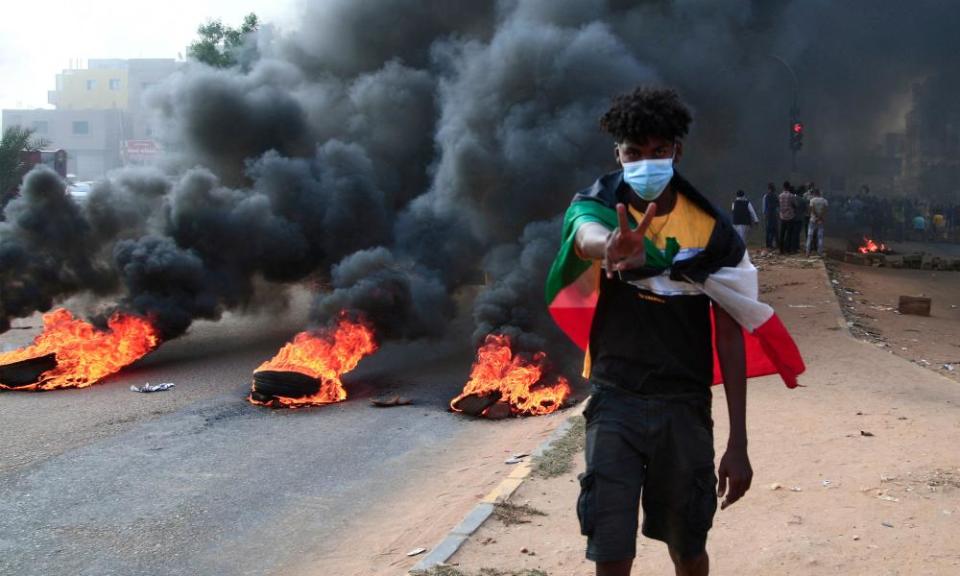Seeds of Sudan coup sown after fall of Omar al-Bashir

In 2019, in the immediate aftermath of the fall of Sudan’s authoritarian leader Omar al-Bashir – who had himself seized power in a military-backed coup in 1989 – the potential for fissures in the country’s nascent political settlement were already obvious.
As representatives of the country’s rebel movements sent delegations to the huge and sprawling public protests in Khartoum and students discussed the possibilities of democracy at coffee stalls set up on the pavement outside universities, the military – which had removed their backing from Bashir – was keeping a watchful eye with its soldiers manning checkpoints.
The consequence of eight months of mounting street protests sparked by increases in the cost living, including the ending of a subsidy for wheat, was that Sudan’s revolution was resolved in a messy compromise.
The democratic transition, the military and civilian actors eventually agreed, would be overseen by a transitional body, a sovereign council incorporating generals and civilian politicians who would oversee the process.
The reality was that many of Sudan’s most pressing competitions for power – between political parties, between army, militias and local rebel groups, and between those who favoured a more Islamist vision for the state – were papered over.
What would transpire in the intervening period was a long-running competition between various Sudanese actors which came to a head in recent weeks and months, including a previous attempted coup only a month ago, as rival interests both pro-military and pro-democracy took to the streets.
On the side of the Sudanese Armed Forces (SAF), represented by the leading general Abdel Fattah al-Burhan, who has now moved to arrest civilian figures in the cabinet including the prime minister, Abdalla Hamdok, there has been mounting dissatisfaction over the perceived weakening of the military in the transition process.
For civilian political leaders, the previous failed coup attempt in September – blamed on members of the military and former Bashir loyalists – had underlined the danger from the military with Hamdok saying the incident confirmed the “need to reform the security and military apparatus.”.
Since that attempted coup both pro-democracy and pro-military factions have been at loggerheads with pro-military groups and their allies launching a sit-in last week calling for a return to military rule.
Complicating the issue is how various parties have used the political tensions to preserve or expand their power bases. Proposals to integrate the notorious paramilitary Rapid Support Forces – whom rights groups have accused of atrocities in Darfur – into the army were resisted by the veteran militia leader General Mohamed Hamdan Dagalo, or “Hemedti”, earlier this year.
For his part Hamdok said earlier this year that unresolved splits among political factions at the helm of Sudan’s transition could result in chaos and civil war.
Among those warning of the possibility of widening violence in the mounting crisis is Theodore Murphy, the director of the Africa programme at the European Council on Foreign Relations, who suggested the military acted for fear it was being weakened and that its move was backed by outside countries.
“Credible reports indicate that Egypt and the United Arab Emirates are supporting SAF’s general direction,” he said.
“Demonstrations have begun and clashes are to be expected between supporters of the civilian component and some protesters animated by a mixture of support to the SAF and some of the armed movements.
“It is exceedingly clear that the civilian-aligned protest movement remains significant in number and that it is convinced that despite SAF’s assurances what is transpiring is effectively a coup.”
Echoing the view that the army may have misjudged Sudanese public opinion, Sanya Suri, the Economist Intelligence Unit’s Africa analyst, said: “While the latest developments highlight a major setback for the country and the fragility of peace, there is little the military can hope to gain by reneging on the power sharing deal.
“International support and financial aid are crucial to help sustain Sudan’s economic recovery especially in the wake of the pandemic.
“International partners will be quick to withdraw support in the event that the military takes over. We expect further unrest in the coming weeks as pro-democracy/pro-civilian rule supporters take to the streets and the military attempts to quash the revolt.”

 Yahoo Finance
Yahoo Finance 